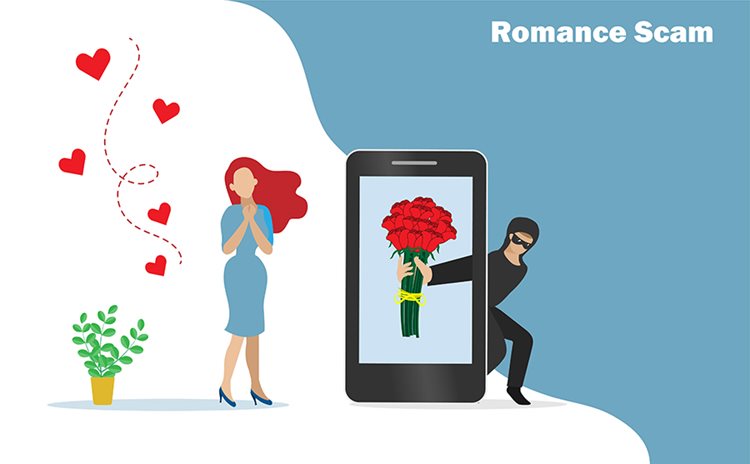Romance Scams

Love hurts – especially when it’s all a scam. With Valentine's Day approaching, people often turn to dating online. While online dating has gained a lot of popularity, it's important to be on the lookout for romance scams, which are quite common. Nearly 70,000 people reported a romance scam in 2022 alone, and reported losses are at $1.3 billion, the Federal Trade Commission reported.
Romance scams occur when a person takes on a fake online identity to gain a victim's trust in order to ultimately obtain financial gain from the victim, according to the FBI. Victims can be both men and women.
Criminals research their potential victims, searching through social media and dating sites for posts divulging information about their lives and personalities. They are career manipulators who utilize these open, personal posts against the victim. Victims are made to believe there is a true connection and become invested in the online relationship.
These scammers often claim to be wealthy, or with business interests requiring that they travel extensively outside the country. Scammers try to establish a relationship quickly, and sometimes propose marriage within months, weeks or even day. When victims attempt to meet them, the scammers never show up, always having excuses.
When trust is gained, the scammers start asking for money. This request could be to pay for a medical emergency, or legal fee for themselves or another member of their family. Alternatively, they may ask for help with a business venture, with a promise to repay immediately when they return from traveling. The victim never sees valid repayment and the scammer will continue asking for more money.
Unfortunately, victims are often hesitant to report the crime due to embarrassment that they were duped, having become emotionally and financially invested in the relationship. Not only does this cause financial loss to the victims, but they also can fall victim to other schemes. The intimate and personal information victims often provide can then be used for identity fraud and financial account takeover schemes, among others. Scammers may even convert their victims into unwitting criminals by blackmailing them to launder and move fraudulent funds, which the victim is then liable for financially, and potentially, criminally.
How to prevent or identify romance scams
-
Be careful of what you post online. Keep social media profiles private whenever possible and limit the personal information you provide online.
-
Research the person’s photo and profile.
-
Ask questions. If a person seems too good to be true, they probably are.
-
Beware if you are asked for inappropriate photos or financial information. Do not send money to people you meet online and have never met in person. Often the photos are used for blackmail, to force you into sending funds to protect your privacy
-
Be suspicious if the person fails to show up for multiple attempts to meet and always has an excuse.
-
Beware of requests for urgent funds due to “emergencies.” Urgent requests like this are often attempts by the fraudster to prey on your emotions and willingness to help
-
Never provide user names or passwords with anyone. There is never a need for anyone to have this private information.
-
If someone you have never met in person rushes into the idea of engagement or marriage, it is often a bad sign.
-
If you are suspicious about information this online party is telling you, talk about it with a known and trust, such as a family member or friend, to see if they identify the same concerns, or additional ones. Often seeing the situation from a third party perspective allows for more clarity into the situation, and for red flags to be identified.